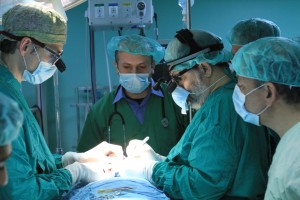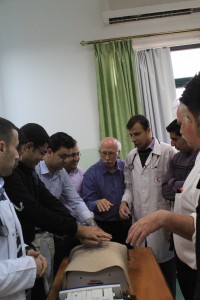Last day in Gaza is another good day of work and listening, by Gerri Haynes
(Gerri Haynes, former president of Washington Physicians for Social Responsibility, has returned to Gaza with a delegation of doctors, nurses and others interested in helping the people there. Gerri will be sending back reports.)
Following a good meeting with the Minister of Health and the Coordinator for International Activities this morning, Rich Grady returned to the hospital to work for another long day – each night, he has returned to the hotel near midnight having operated and instructed throughout the day. Bob Haynes and Bill Dienst spent this last day teaching Advanced Life Support to classes in two hospitals, completing a week of instruction for dozens of students.
This afternoon, Nikki Nichols and I met with a group of women in an impoverished area of
Gaza. I had met with these women in April 2012 and they assembled in a room just off the street – a room where their children roamed in and out – curious about the meeting their mothers were having. While I talked with the women, Nikki gave a chair massage to each of them. All of the women have experienced the death of a family member in one of the attacks on Gaza. Today, they talked about the effects of the siege on their lives. Here are their words:“The situation is getting worse. Food is too expensive – we cannot afford chicken. We cannot afford medicine. Unemployment is increasing. UNRWA (the United Nations Relief and Works Agency – organized to provide assistance, protection and advocacy for families in the Near East) is restricting services and we do not get enough food aid or money to be able to live. (Funding to UNRWA has decreased and there have been recent threatening protests at the UNRWA site in Gaza City.) If they cannot help us, they need to let us go back to our land (farmland in the NO GO zone which comprises one third of the arable land in the Gaza Strip). We need our government to come to peace with the Ramallah government so that they can work together to free us.”
“I work as a cleaner for 100 dollars/month. UNRWA told me that this is enough and quit giving aid to my family. I cannot feed my family of eight, pay school expenses (see below) and taxes for this much money. I don’t know about meat for my family – I only hear about meat. We were invited for a family nutrition workshop at ANERA – they told us to feed our children protein … we would like to do this, but we have no money for such things.”
Another woman said, “Even those who work in the government have had their salaries cut in half. We have become overwhelmed with loans and now suffer from debt we cannot pay. More people are committing suicide (strictly forbidden by Islam). The stress is too much.
During the last war on Gaza, her cousin was cooking in her home when a man from Hamas (being targeted by Israel) came in – a bomb destroyed their home, killing the whole family. Everyone has had a family experience with violent death during the attacks by Israel. They live daily with the fear of another attack – there is nowhere for them to go. Hundreds of civilians were killed or wounded in the November 2012 attacks and they and their children live every moment with the anxiety about another attack.
Because of the economic situation, the level of domestic violence is up – all of the women agreed with this observation. “Our children come to us for money (to be able to pay the fees for school) and because there isn’t enough money, my husband hits them. He is very, very frustrated.”
Medical problems in their children are not being resolved. “Two of my children stutter since the last war. They know about the Israelis targeting cell phones and that people are killed when the Israelis track a phone. The 13-year-old friend of a neighbor borrowed the phone of someone being targeted and the child was killed.
“My problem is no medicine. My seven-year-old daughter has epilepsy and there is no medicine to treat her.” Another woman said that since the war, her nine-year-old daughter has started wetting the bed and no one has been able to help her. “Our children cannot concentrate in school. They are hungry and there are nervous. Their academic achievement has become zero. As adults and parents we cannot help them. The curriculum is very difficult. The school day is short (double shifting) and we cannot afford to pay for the extra classes that are offered after school. Each of these classes costs ten dollars/month/child. We do not have that money. Our children go to school in Beach Camp – it is a very long walk, but we cannot afford to send them on a bus, so they walk through the rain in the winter and become very cold. We have to pay for uniforms for the school – we cannot afford to pay for these uniforms. We cannot afford food for them for school. At school, the water is polluted and we cannot afford to buy clean water for them. Because the electricity is off much of the time, our children have to study by candlelight – this is not enough light and it is dangerous. Many children have died in fires caused by candles.”
I asked about generators. “Generators – don’t remind us! We get mad (crazy) from the noise of the generators. Many people stopped using them because you have to buy fuel to run them and we cannot afford the fuel. When they are running, you can’t concentrate on anything – the noise is so loud. On the other hand, the dark is very scary. Our children stay in one room, afraid of the dark (and what it has brought in the wars.) My husband is working, but it is a very small salary and they take the fees for electricity from him. If he doesn’t pay the fees, we don’t have electricity, even when it is running. Today is a “free” day – we will have electricity all day long, but this is very rare.”
The women were clearly friends; their children played together as family; the air of frustration was strong. They wanted us to tell our government to help end the siege – to let the people of Gaza be free to find jobs and to work in their farms and to fish in the sea.
RSS feed for comments on this post. TrackBack URI

